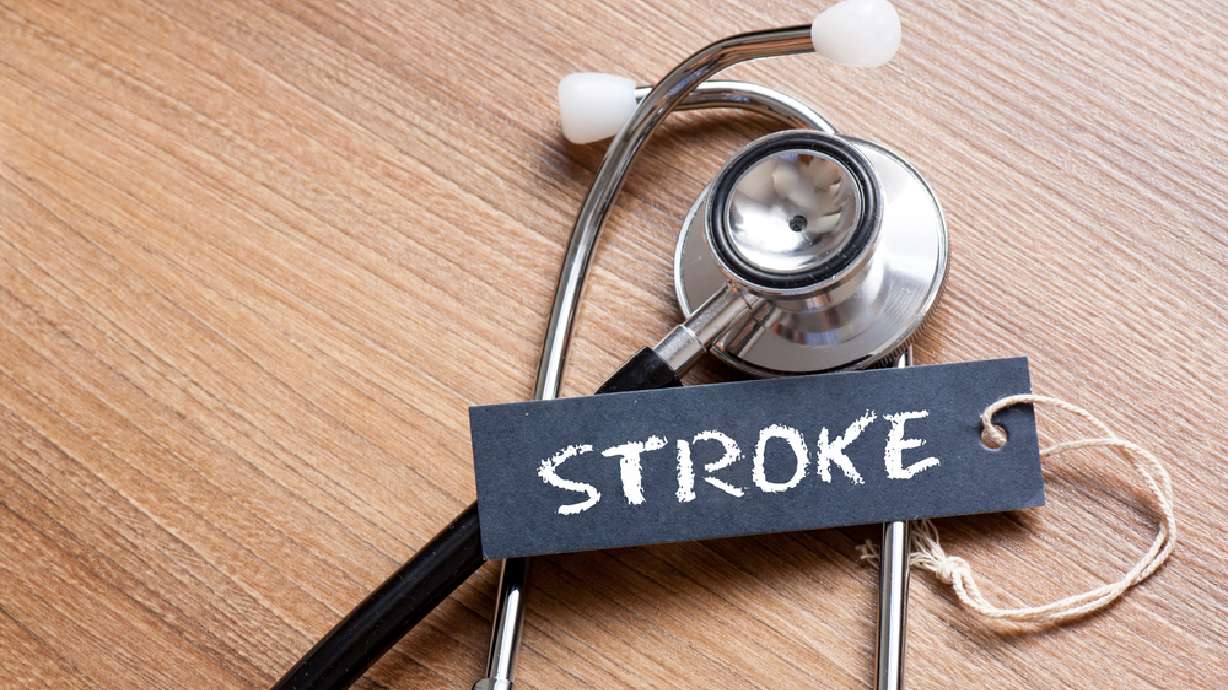Estimated read time: 5-6 minutes
This archived news story is available only for your personal, non-commercial use. Information in the story may be outdated or superseded by additional information. Reading or replaying the story in its archived form does not constitute a republication of the story.
May is stroke awareness month and doctors at Intermountain Healthcare urge people to recognize the signs and symptoms of a stroke so they can know what to do if someone around them is experiencing symptoms.
Stroke is a term that physicians use when a part of the brain is damaged because of a problem with blood flow.
Strokes can happen when:
• An artery going to the brain gets clogged or closes off, and part of the brain goes without blood for too long. This accounts for approximately 85% of strokes
• An artery breaks open and starts bleeding into or around the brain
The effects of a stroke depend on several factors including which part and how much of the brain is affected and how quickly the stroke is treated
Some people who have a stroke have no lasting effects. Others lose important brain functions. For example, some people become partly paralyzed or unable to speak. Stroke is one of the leading causes of death and disability in the world.
Only around 40 percent of people in the United States can identify the major symptoms of a stroke.
A good way to remember the signs of stroke is by using the acronym BE FAST:
B = Balance – sudden dizziness or loss of balance and coordination
E = Eyes – sudden trouble seeing in one or both eyes
F = Face – sudden weakness of the face (Does one side of the face droop?)
A = Arm – weakness of an arm or leg
S = Speech – sudden difficulty speaking
T = Time – time the symptoms started

"Someone suffering from a stroke doesn't often go to ask for help. It's important to educate communities to help and act on a patient's behalf because they physically can't themselves when suffering from an episode. If you believe you or another person is having a stroke, call 911 immediately," said Kellie Nelson, MD, a neurohospitalist at Intermountain McKay-Dee Hospital in Ogden.
The right treatment depends on what kind of stroke you are having. You need to get to the hospital very quickly to figure this out.
At the hospital, the doctors will do tests to confirm that you are having a stroke and figure out what type of stroke it is. This involves imaging tests such as a CT scan or MRI, which create pictures of the brain. Other imaging tests are used to look at the blood vessels or the heart
Quick treatment during a stroke is one of the most important factors in determining a good outcome. A stroke occurs when a portion of the brain doesn't get enough blood for a period of time.
"We have a saying in neurology that "Time is Brain", which means the sooner patients get treated, the fewer brain cells will be lost. Every second a person is having a stroke, 32,000 neurons die," said Dr. Nelson. "The faster we get you to the hospital the better odds a person has of a full recovery without losing brain or body functions."
A new study shows that for every second someone delays emergency stroke care, it's associated with 2.2 hours of less healthy life.
"Strokes can happen at almost any age and that's why it's important for anyone experiencing these symptoms to seek emergency care immediately. However, risk factors for stroke include heart disease, diabetes, high blood pressure, high cholesterol, and smoking. A person should also know their family history because genetic tendencies for stroke exist," said Dr. Nelson.
Many strokes can be prevented, though not all. You can greatly lower your chance of having a stroke by taking your medicines exactly as directed. Medicines that are especially important in preventing strokes include:
- Blood pressure medicines.
- Medicines called statins, which lower cholesterol.
- Medicines to prevent blood clots, such aspirin or blood thinners.
- Medicines that help to keep your blood sugar as close to normal as possible (if you have diabetes).
Making lifestyle changes:
- Stop smoking, if you smoke.
- Get regular exercise (if your doctor says it's safe) for at least 30 minutes a day on most days of the week.
- Lose weight, if you are overweight.
- Eat a diet rich in fruits, vegetables, and low-fat dairy products, and low in meats, sweets, and refined grains (such as white bread or white rice).
- Eat less salt (sodium).
- Limit the amount of alcohol you drink
- If you are a woman, do not drink more than one drink a day.
- If you are a man, do not drink more than two drinks a day.
If you have stroke symptoms that only last a few minutes or hours, you may have had a transient ischemic attack (TIA). Transient symptoms are also worrisome because they may mean that another stroke is likely to occur soon. People should still call 911 and come to the emergency department for rapid evaluation. Quick action may often lead to a quick recovery.
It's vital to remain optimistic and focus on getting a patient to recovery. It's important to recognize that the goal is to recover from a stroke.
The Intermountain Healthcare team of specialists has developed protocols that shorten the amount of time it takes to diagnose and treat a stroke. This is important because a quick diagnosis and treatment can mean less long-term damage, less disability and better overall outcomes.
Intermountain offers a full spectrum of specialized care that ranges from neuro-critical care through acute care and into rehabilitation and outpatient therapy.








